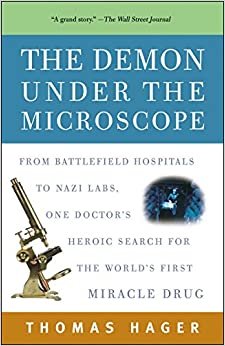

(Although I found that every once in a while he gives away the punch line before he tells the story.) The second half of the book gives a fascinating and unique glimpse into Germany from before WWI to after WWII when the discovery of the magic bullet sulfa revolutionized the foundations of modern medicine. The first part of the book does some jumping back and forth in time mostly to great effect as he reacquaints us with the discovery of the germ theory and early serum medicine. His descriptive writing is excellent, a rare talent in a writer who understands science. His manages to take both well know discoveries and little know episodes and weave them together into a story that is informative and entertaining. It is a great pleasure to read a science author who knows both how to write and understands the subject. Overall, though, I really must give this story my highest ratings and would recommend it to the layman and scientist alike. I rather think that had more to do with the fact that this is an audio book and you need to pay careful attention. I'll bet you didn't know Calvin Coolidge had a son who died because a blister on his foot got infected? Or that Doctors used phenols to treat a minor medical procedure on Queen Victoria? Or that the Nazis prevented the most brilliant scientists of their time from getting a Nobel prize? At times I got a bit confused when the author backed up to explain some historical or preceding event. It is actually the history of the treatment (or lack thereof) of bacterial infections over the years. This is the most intriguing and interesting story I've read this year. I purchased it on the strengths of the other reviews. This purports to be the story of the development of sulfa drugs. This is a fascinating scientific tale with all the excitement and intrigue of a great suspense novel. The very concept that chemicals created in a lab could cure disease revolutionized medicine, taking it from the treatment of symptoms and discomfort to the eradication of the root cause of illness.Ī strange and vibrant story, The Demon Under the Microscope illuminates the colorful characters, corporate strategy, individual idealism, careful planning, lucky breaks, cynicism, heroism, greed, hard work, and central (though mistaken) idea that brought sulfa to the world. And it ushered in the era of modern medicine.

It transformed the way doctors treated patients. Sulfa changed the way new drugs were developed, approved, and sold. Sulfa saved millions of lives, among them, Winston Churchill's and Franklin Delano Roosevelt, Jr.'s, but its real effects have been even more far reaching. In The Demon Under the Microscope, Thomas Hager chronicles the dramatic history of the drug that shaped modern medicine. This incredible discovery was sulfa, the first antibiotic medication. It conquered diseases, changed laws, and single-handedly launched the era of antibiotics.


 0 kommentar(er)
0 kommentar(er)
